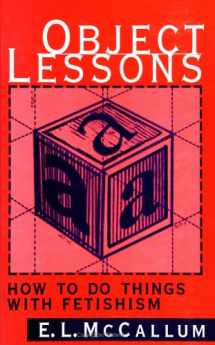
Object Lessons: How to Do Things with Fetishism
ISBN-13:
9780791439807
ISBN-10:
0791439801
Author:
E. L. McCallum
Publication date:
1998
Publisher:
State University of New York Press
Format:
Paperback
230 pages
FREE US shipping
Book details
ISBN-13:
9780791439807
ISBN-10:
0791439801
Author:
E. L. McCallum
Publication date:
1998
Publisher:
State University of New York Press
Format:
Paperback
230 pages
Summary
Object Lessons: How to Do Things with Fetishism (ISBN-13: 9780791439807 and ISBN-10: 0791439801), written by authors
E. L. McCallum, was published by State University of New York Press in 1998.
With an overall rating of 3.6 stars, it's a notable title among other
books. You can easily purchase or rent Object Lessons: How to Do Things with Fetishism (Paperback) from BooksRun,
along with many other new and used
books
and textbooks.
And, if you're looking to sell your copy, our current buyback offer is $0.59.
Description
An important contribution to our understanding and interpretation of fetishism and of what fetishism can teach us about sexuality, gender, belief, and knowledge.
Object Lessons begins with the question, What can fetishism teach us? One answer, as this book makes clear, is that fetishism is a form of subject-object relation that informs us about basic strategies of defining, desiring, and knowing subjects and objects in Western culture. More importantly, in the way that it brings together peculiarly modern anxieties―especially those about sexuality, gender, belief, and knowledge―fetishism reveals how our basic categories for interpreting the world have been reduced to binary and mutually exclusive terms. By foregrounding concerns about sexual differences in examining fetishism’s unique intersection of desire and knowledge, Object Lessons seizes on the promises fetishism offers to those who want to call into question the resurgence of conservative and even reactionary drives to lock down absolute definitions of sexual differences through either biological or cultural essentialism.
Object Lessons begins with the question, What can fetishism teach us? One answer, as this book makes clear, is that fetishism is a form of subject-object relation that informs us about basic strategies of defining, desiring, and knowing subjects and objects in Western culture. More importantly, in the way that it brings together peculiarly modern anxieties―especially those about sexuality, gender, belief, and knowledge―fetishism reveals how our basic categories for interpreting the world have been reduced to binary and mutually exclusive terms. By foregrounding concerns about sexual differences in examining fetishism’s unique intersection of desire and knowledge, Object Lessons seizes on the promises fetishism offers to those who want to call into question the resurgence of conservative and even reactionary drives to lock down absolute definitions of sexual differences through either biological or cultural essentialism.


We would LOVE it if you could help us and other readers by reviewing the book
Book review

Congratulations! We have received your book review.
{user}
{createdAt}
by {truncated_author}


